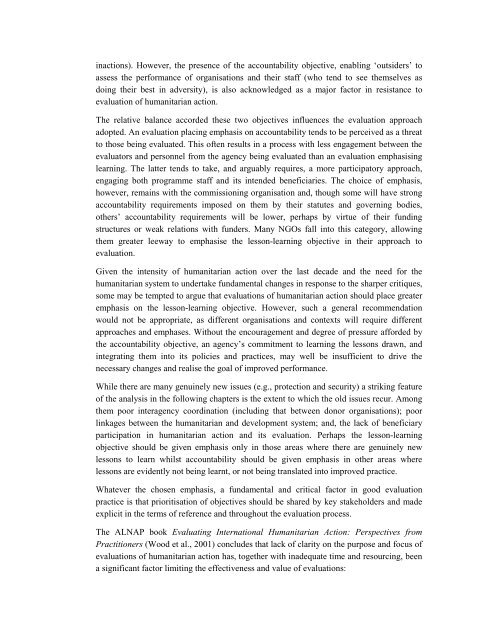Download PDF - ReliefWeb
Download PDF - ReliefWeb
Download PDF - ReliefWeb
Create successful ePaper yourself
Turn your PDF publications into a flip-book with our unique Google optimized e-Paper software.
inactions). However, the presence of the accountability objective, enabling ‘outsiders’ to<br />
assess the performance of organisations and their staff (who tend to see themselves as<br />
doing their best in adversity), is also acknowledged as a major factor in resistance to<br />
evaluation of humanitarian action.<br />
The relative balance accorded these two objectives influences the evaluation approach<br />
adopted. An evaluation placing emphasis on accountability tends to be perceived as a threat<br />
to those being evaluated. This often results in a process with less engagement between the<br />
evaluators and personnel from the agency being evaluated than an evaluation emphasising<br />
learning. The latter tends to take, and arguably requires, a more participatory approach,<br />
engaging both programme staff and its intended beneficiaries. The choice of emphasis,<br />
however, remains with the commissioning organisation and, though some will have strong<br />
accountability requirements imposed on them by their statutes and governing bodies,<br />
others’ accountability requirements will be lower, perhaps by virtue of their funding<br />
structures or weak relations with funders. Many NGOs fall into this category, allowing<br />
them greater leeway to emphasise the lesson-learning objective in their approach to<br />
evaluation.<br />
Given the intensity of humanitarian action over the last decade and the need for the<br />
humanitarian system to undertake fundamental changes in response to the sharper critiques,<br />
some may be tempted to argue that evaluations of humanitarian action should place greater<br />
emphasis on the lesson-learning objective. However, such a general recommendation<br />
would not be appropriate, as different organisations and contexts will require different<br />
approaches and emphases. Without the encouragement and degree of pressure afforded by<br />
the accountability objective, an agency’s commitment to learning the lessons drawn, and<br />
integrating them into its policies and practices, may well be insufficient to drive the<br />
necessary changes and realise the goal of improved performance.<br />
While there are many genuinely new issues (e.g., protection and security) a striking feature<br />
of the analysis in the following chapters is the extent to which the old issues recur. Among<br />
them poor interagency coordination (including that between donor organisations); poor<br />
linkages between the humanitarian and development system; and, the lack of beneficiary<br />
participation in humanitarian action and its evaluation. Perhaps the lesson-learning<br />
objective should be given emphasis only in those areas where there are genuinely new<br />
lessons to learn whilst accountability should be given emphasis in other areas where<br />
lessons are evidently not being learnt, or not being translated into improved practice.<br />
Whatever the chosen emphasis, a fundamental and critical factor in good evaluation<br />
practice is that prioritisation of objectives should be shared by key stakeholders and made<br />
explicit in the terms of reference and throughout the evaluation process.<br />
The ALNAP book Evaluating International Humanitarian Action: Perspectives from<br />
Practitioners (Wood et al., 2001) concludes that lack of clarity on the purpose and focus of<br />
evaluations of humanitarian action has, together with inadequate time and resourcing, been<br />
a significant factor limiting the effectiveness and value of evaluations:
















![CynefinFramework final [Read-Only]](https://img.yumpu.com/19017304/1/190x135/cynefinframework-final-read-only.jpg?quality=85)